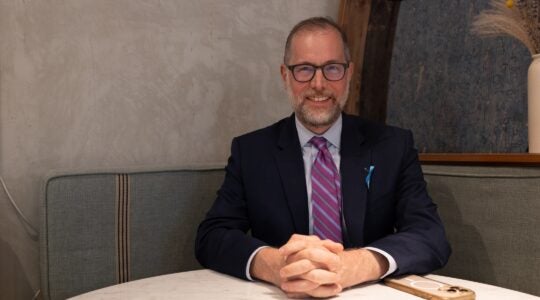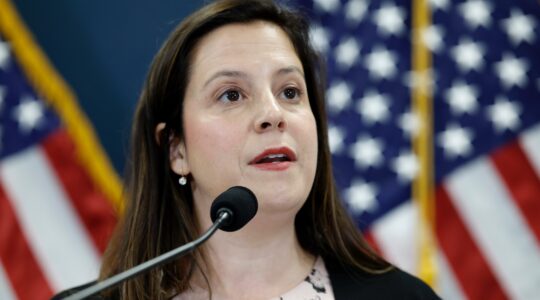JERUSALEM (JTA) — Ron DeSantis may not have declared that he’s running for president yet, but his anticipated campaign was on full display Thursday at a conference in Jerusalem, where he ran down a laundry list of issues relevant to Israel and American Jews.
Most of the Florida governor’s remarks reflected what has become Republican orthodoxy in the post-Donald Trump era: He supports Israeli West Bank settlements as well as keeping Jerusalem under full Israeli control. He wants the United States to be more aggressive toward Iran’s nuclear program. He vehemently opposes the movement to boycott Israel.
And he declined to take a position on the Israeli government’s effort to sap the Israeli Supreme Court of much of its power — which President Joe Biden, a Democrat, has repeatedly criticized as a danger to Israeli democracy.
“We must also, in America, respect Israel’s right to make its own decisions about its own governance,” he said. “You’re a smart country. You figure it out. It shouldn’t be for us to butt into these important issues.”
He also pushed back at claims that his legislation has led to the banning of Holocaust books in his state, calling them “fake narratives” (though multiple Holocaust books have been pulled from schools). And, at a press conference, he signed a bill that aims to penalize antisemitic harassment. He also touted a new law that gives vouchers worth thousands of dollars to parents who send their children to private schools, something Orthodox advocates have cheered.
“We’ve really seen a historic migration of American Jews and Israeli Americans moving to southern Florida,” he said. “It’s really, really boomed, and I think Florida’s policies have really reinforced that.”
DeSantis, who landed in Israel yesterday, was the keynote speaker at a conference on Thursday hosted by the Jerusalem Post at the Museum of Tolerance here. He received multiple standing ovations and cheers throughout the morning. At a press conference after his speech, some of his supporters sat among the journalists and clapped at his responses.
Israel is the latest on a four-stop international trip by DeSantis, who is expected to announce later this year that he will challenge former President Donald Trump for the Republican presidential nomination. On the trip, he is meeting with Israeli Prime Minister Benjamin Netanyahu, President Isaac Herzog and other officials. His trip also includes stops in Japan, South Korea and the United Kingdom.
“If there’s any announcements, those will come at the appropriate time,” he said in response to a question about his potential candidacy.
In his speech, DeSantis described his past support for Israel, including advocating for the 2018 move of the U.S. embassy from Tel Aviv to Jerusalem and, in 2019, holding a Florida cabinet meeting in Jerusalem. He also told the crowd that he baptized his children with water from the Sea of Galilee and said he put a note in the Western Wall asking God to protect Florida from hurricane season.
An affinity for the Bible also played a role in DeSantis’ position on the West Bank, which he called “disputed” rather than “occupied.” He referred to the territory by the term “Judea and Samaria,” which is the Israeli government’s standard term for the area and also emphasizes its place in the Bible. He spoke of visits to the northern West Bank settlement of Ariel, as well as to the City of David, a Jewish neighborhood and archaeological site in eastern Jerusalem.
“We visited the Biblical heartland of Judea and Samaria,” he said during his speech regarding a previous trip. Later, at the press conference, he said, “Those are the most historic Jewish lands there are, going back thousands and thousands of years.”
He also came out staunchly in favor of continued Israeli control of eastern Jerusalem, claiming that it is the best way to ensure religious freedom in the city. Palestinians aspire for the city’s eastern area to be the capital of a future Palestinian state.
“With Israeli sovereignty over the city of Jerusalem, people have the ability to practice their religion freely,” he said. “They have the ability to visit their sites freely. That would just actually not be true if that were in other hands.”
Although his Israel policies dovetail with those of Trump, and even though Trump’s Israel ambassador, David Friedman, was at the conference, DeSantis avoided saying the former president’s name in his speech, instead referring to “the previous administration.” He did say Trump’s name twice during the press conference.
Following his speech, DeSantis announced partnerships with Israeli firms to develop tech products, and portrayed his state as an inviting home for Jews. He said the state had invested millions of dollars into synagogue security as well as Holocaust education. And he signed a bill that bans projecting threatening images on buildings without permission, as well as littering with the intent to intimidate.
Florida has seen an uptick recently in white supremacist activity. The Goyim Defense League, a far-right antisemitic group, relocated there last year. In October, several public spaces in Jacksonville displayed messages promoting the antisemitic ideas of rapper Kanye West. Neo-Nazis intimidated attendees at an Orlando-area Chabad center in February, and last week, police arrested a man for a March attack on a different Florida Chabad center.
“This is going to be able to provide more tools to be able to combat antisemitic activity,” DeSantis said. ״If you have a synagogue and someone shines a swastika-like image on that, they have a right to do the image for themselves, but putting it on someone else’s property, they’re defining that in this bill as a trespass.”
The signing of that bill, and DeSantis’ contention that he supports Holocaust education, comes as legislation he signed has enabled parents in the state to pursue bans of Holocaust literature. A South Florida school district library removed a Holocaust-themed novel by Jodi Picoult in March, and this month, a high school in the state removed a graphic novel adaptation of Anne Frank’s diary from its shelves. (Other Jewish books, including ones about Purim and Shabbat, have also been caught up in the dragnet, which has largely focused on books about racial equity and LGBTQ issues.)
Despite those instances and other bans parents are seeking, DeSantis said there was no significant campaign to ban Holocaust books. He called that allegation the “book ban hoax.”
“Those are all fake narratives,” he said. “We’ve provided curriculum transparency for parents, to make sure that the curriculum used in school is transparent and to make sure everything is age appropriate and is not conflicting with Florida standards. And so, what parents have identified unfortunately are pornographic images in books.”
The legislation, which has targeted books about sexuality and gender, is at the center of DeSantis’ campaign to limit or ban discussion of those topics in schools. Another law, called the “Parental Rights in Education” bill and dubbed by critics as the “Don’t say gay” bill, also bans discussion of LGBTQ topics between kindergarten and third grade, among other measures. It is one of a series of recent state laws limiting transgender rights.
That law is also at the center of DeSantis’ feud with Disney, the state’s largest employer, which just sued the governor for allegedly punishing the company for its criticism of the law. At the press conference, DeSantis said the suit is about Disney wanting “to be able to control things without proper oversight.”
DeSantis did not refer specifically to the Anne Frank graphic novel in his remarks and said Florida had “beefed up” Holocaust education in the state. But a Jewish ally of his who accompanied him on the trip, Republican state Rep. Randy Fine, defended banning the book, which he called the “Anne Frank pornography book.” (Fine authored the bill barring the distribution and display of “ethnic intimidation” materials.)
“I read the diary of Anne Frank many times as a kid and I don’t remember any of that stuff that they put in that graphic novel,” Fine told the Jewish Telegraphic Agency. “And frankly that graphic novel is antisemitic. To sexualize the diary of Anne Frank in that sort of inappropriate way, it is antisemitic.”
When told that the passages, which are authentic and relate to Frank’s attraction to another girl as well as a description of her own genitalia, have been included in the diary for decades, Fine said that the graphic novel was inappropriate regardless because it depicted the passages in an image.
“It wasn’t just that the passages were in the book,” he said. “It was how they were visualized.”
JTA has documented Jewish history in real-time for over a century. Keep our journalism strong by joining us in supporting independent, award-winning reporting.






